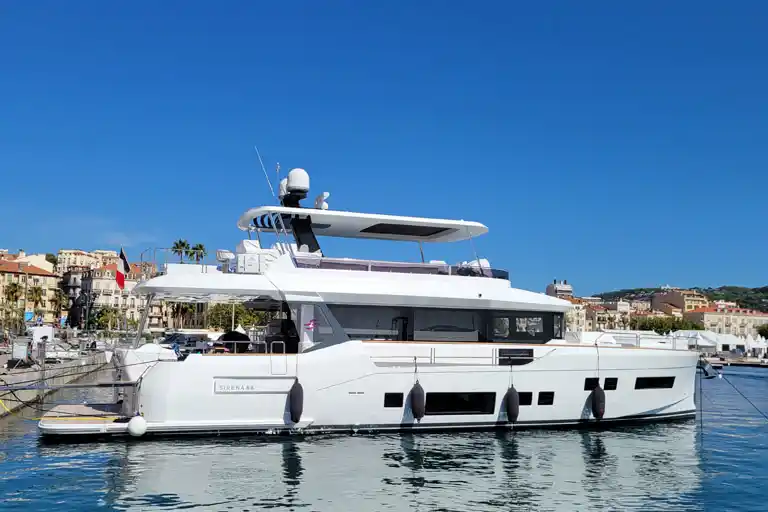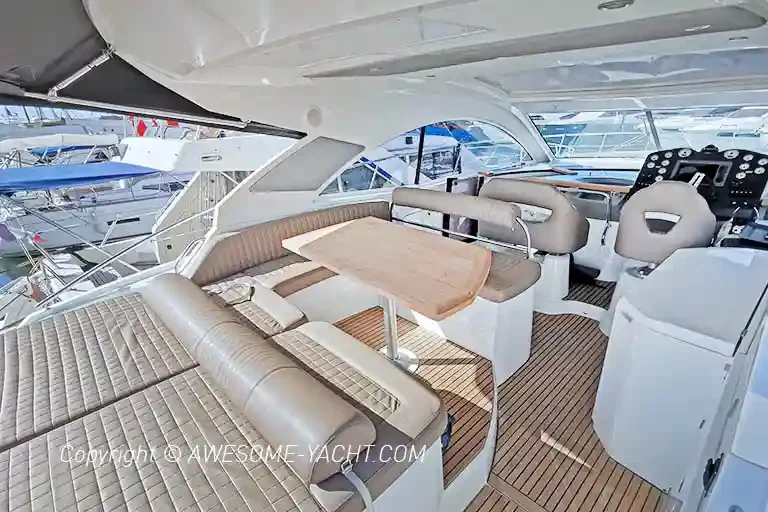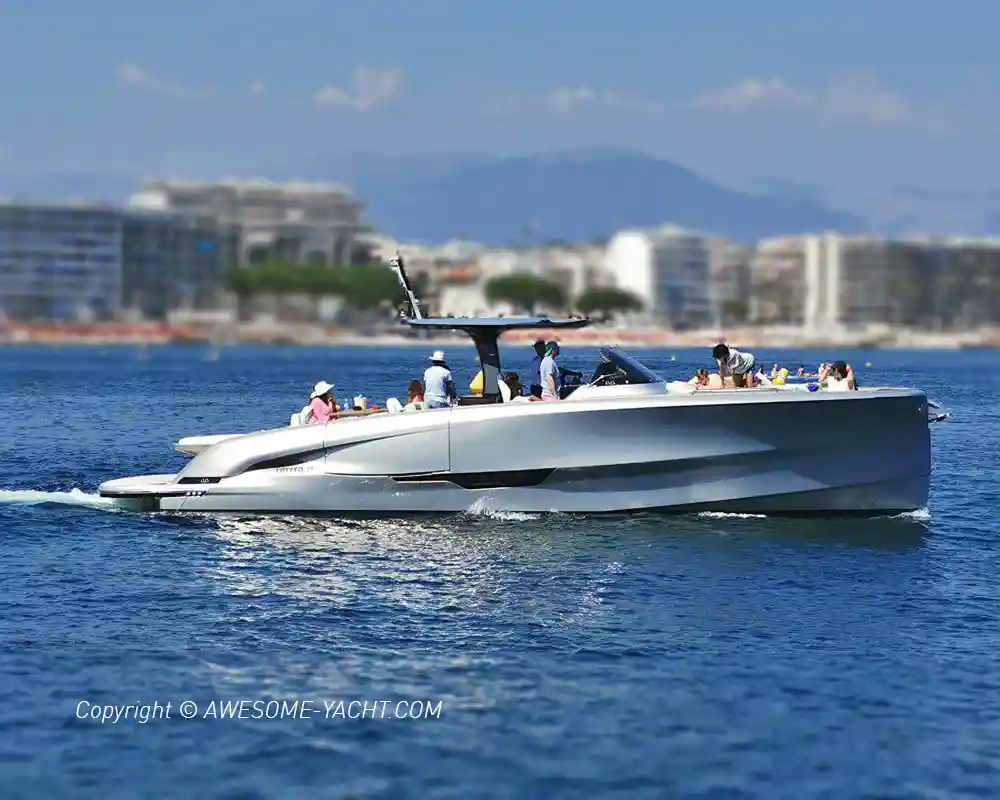How to buy a boat (2025)
Published March 23, 2025 by Remi van der Deure
Considering yacht ownership?
Owning a yacht is the key to a new lifestyle filled with freedom and possibility. However, the journey you need to take to get there is fraught with the need for careful planning and knowledge in yacht choices, especially for first-time yacht owners. Whether you’re looking to buy new or broker a used yacht, this yacht buying guide covers everything you’ll need to know before signing on the dotted line to ensure you do so with confidence so you can sail away with your dream vessel.
10 questions to ask before buying a boat
Define your yachting goals before you begin your search to prevent costly mistakes.
1. What is the typical usage and type of the yacht?
Determine your intended use.
Is the boat intended for cruising, fishing, racing, chartering, or seasonal living?
How you intend to use the vessel plays a major role in what is the right type of vessel.
Type of yacht
What type of yacht are you interested in?
Will you have any guests with special needs — they may be, either, mobility or age related?
Each type of yacht (sailboat, motor yacht, catamaran, superyacht etc.) has its benefits and lends itself to a different lifestyle.
Sailboats are low fuel-consuming and provide almost limitless autonomy, although they can demand a bigger and skilled crew.
Motor yachts offer better speed, comfort, and higher quality of facilities.
Consider chartering a yacht that’s similar to the one you have your eye on before buying it. That lets you evaluate whether the layout, cruising comfort, fuel consumption and handling characteristics are suitable for your needs and preferences.
R. van der Deure
2. New Vs. Pre-Owned?
Are you buying a new boat or pre-owned?
A new boat comes with the benefit of factory warranties and the ability to choose various options like a hi-lo swim platform or stabilizers.
On the other hand, secondhand boats can offer a bigger boat for the money, and any early problems may have been solved by prior owners.
For first-time yacht owners, we advise against purchasing a used vessel requiring a full refit. It’s often more complex and costly than anticipated.
R. van der Deure

3. Do you need financing?
Will you be requiring financing to purchase the yacht?
For a new boat you can consider a LOA (Location avec Option d ‘Achat) leasing in France. You can select a boat model and options from a boatbuilder or dealer.
The good news is that the financing of a new and used boat through a leasing is also possible if it is taxable in terms of VAT.
Check out our boat loan calculator.
Get a preapproved loan before you start your yacht hunt. It surely would make the purchase so much easier and save you from the disappointments and missed out opportunities.
R. van der Deure
4. How can I find a suitable berth for my yacht?
Purchase or rent a berth?
Do you know what is an “ammodiation”?
If it might seem simple to secure a mooring in the French Riviera, eachmarina isn’t the samemaking and process vary.
Owing to the ever-expanding number and size of boats, there is strong demand for premium berths in the southern France around Menton and Saint-Tropez. Mooring your dream craft can be a tricky affair, particularly for owners who want to be close to their waterfront pads.
5. What is the average expense associated with owning a yacht?
Including annual operational costs as a part of your yacht ownership budget beyond the acquisition price is something to consider when planning your purchase.
These costs include fuel, maintenance, insurance, crew (when applicable), and berthing fees of between 10 and 14 percent of the value of the yacht. Chartering, even for short periods of time, can help partially offset these costs, although it may curtail your personal use calls during peak times such as July and August.
6. Why are yacht layout and accommodation important?
How many guests do you intend to accommodate on board on a regular basis?
Will you sleep aboard, and if so, how many cabins do you need?
Keep in mind that although aesthetics are a big part of design, also think about accommodation and general arrangement especially for vessels carrying children or elderly individuals.
R. van der Deure

7. How do cruising areas and seasonality relate to yachting?
Do you like being at anchor better than being docked in a port?
A boat ideal for anchoring will prioritize stability and autonomy in varying conditions. Air conditioning and stabilizers significantly enhance onboard comfort while at anchor.
Do you need a long-range cruising vessel for extensive cruises?
Long range cruising vessels boast significantly strengthened hulls for enduring harsh sea conditions, vastly increased fuel and water capacities for self-sufficiency, and redundant, efficient power systems to ensure reliability.
Are you planning to use your boat in winter?
Displacement yachts may be more suitable for winter cruise because they often have more interior space and comforts (they come with sophisticate stabilisation system) than most sport yachts.
Sport yachts offer sleek lines, open deck spaces well-suited for the warm Mediterranean summer weather, and greater speed – perfect for island hopping.
8. Should I charter my yacht?
If you are looking to regularly get your yacht chartered in France, you’ll need a qualified skipper (minimum Captain 200) and proper insurance.
A suitable ownership structure and a commercially registered yacht is also required. Unlike Spain and Greece, you don’t need a charter license in France. Finally, keep in mind that a professional crew makes for a much better ownership and charter experience!
Check out our luxury yacht charter website.
9. Why use a broker?
A yacht broker can help to source the vessel that meets your needs at the right price, and navigate the paperwork with the French authorities required to establish ownership in France or elsewhere, whilst also giving a wealth of market insights when it comes to cost and property upkeep.

10. What is the process for buying a yacht?
Buying a boat may be time consumming if you don’t follow a strict process.
Here are the major steps when buying a boat.
Yacht viewing
Call up a broker and schedule a viewing after doing your online research.
Inspections may take place at scheduled boat shows, or by private appointment, pending yacht’s availability. It is very important to review the yacht when you are there visibly as well as technically (machinery, the generator, stabilizer, and HVAC systems).
Plan a boat visit with your anticipated guests: your spouse, friends, or captain.
R. van der Deure
Offer
After you find an appropriate yacht, your broker will submit a formal offer using an industry-standard purchase agreement. The agreement defines the schedule for the sea trial, survey, acceptance and closing. You typically put down a 10% deposit of the offer price that is held in escrow with your attorney or broker.
Always get an offer in writing, listing all parts of the vessel, dependent on a good survey. This gives you the opportunity to negotiate the price based on needed repairs. The seller has the option to accept, reject, or counter your offer.
Sea trial
Take the boat out on a sea trial for testing performance and handling. Keep in mind that operating with a partial crew compared to a full passenger complement can be worlds apart. Check all major equipment, including stabilizer, air conditioning, etc.
The sea trial, which is generally no more than four hours, is regularly paid for by the seller.
Check cruising and max speeds during the trial and evaluate how the boat moves and sounds throughout the interior.
Marine survey
It is strongly advised to hire an independent marine surveyor. Like a home inspector, the surveyor will do a total inspection and write up a report on the state of the boat.
Note: the buyer is responsible for the marine surveyor cost, and the cost of hauling the boat to inspect hull, stabilizers and propellers.
Purchase agreement
After successful survey and sea trial, the buyer gives written acceptance of the vessel. If the buyer chooses not to go through with the sale, the 10% deposit is now at risk. Deficiencies discovered during the survey are often accommodated by a conditional acceptance allowing the seller time to remedy defects or to offer a monetary concession for the buyer.
An example: a conditional acceptance may reduce the agreed price by 10,000 euros when it is a question of an air-conditioning system defect that cannot be repaired before the closing.
Delivery, ownership
When you sign the purchase agreement, ensure you understand the delivery date and method.
Make sure you and/or your captain have a detailed walkthrough of the boat’s systems before you take possession.
More information?
Read our boat sales & purchase FAQ






